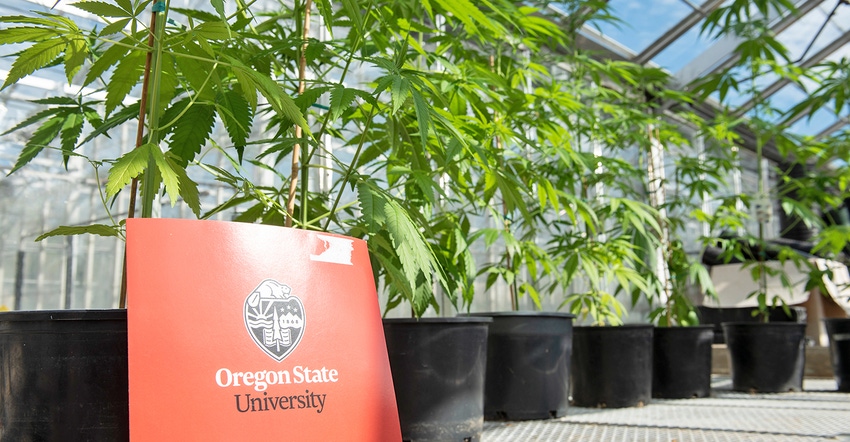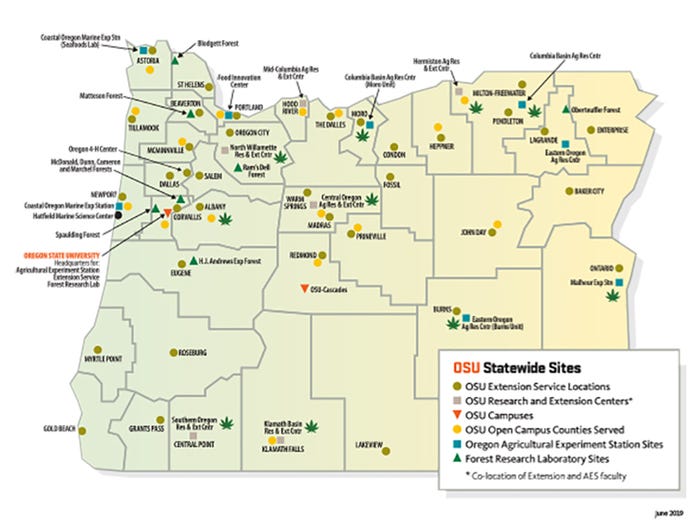June 24, 2019

Hemp has become the hot new crop once approved by the 2018 Farm Bill. But research into the crop has been fragmented across the country. Oregon State University opened a new research center in mid-June that could change all that.
The new Global Hemp Innovation Center will be based in OSU’s College of Agricultural Sciences with research taking place across the state and the world, according to a media announcement. The university has 40 faculty member representing 19 academic disciplines engaged in hemp research, teaching and Extension services. The center will be a research hub, connecting faculty and researchers in plant research, food innovation, pharmacy, public health, public policy, business and engineering.
Hemp offers the promise to become a major ag commodity in the United States and abroad, with hemp plant fiber put to use in a number of ways — from manufactured products to clothing and construction materials. And hempseed oil is being investigated for use in pharmaceuticals, cosmetics, foods and nutraceuticals.
In the release announcing the center’s opening, Alan Sams, dean of the OSU College of Agricultural Sciences, noted the value of the center: “Our faculty are already recognized internationally as the go-to experts for hemp research. The launch of this center signifies our commitment to continue to build upon that established expertise.”
Sams added that hemp has significant potential across several industry sectors, including food and health products, and as a fiber commodity. He noted that OSU is “uniquely positioned to serve the global need for research-based understanding of hemp as a crop, and for its use in new products.”
The Brightfield Group, a market analytics firm tracking the cannabis industry, has predicted that the hemp-derived cannabidiol (CBD) market is expected to grow from $618 million in 2018 to more than $22 billion by 2022.

MULTIPLE SITES: Oregon State University has 40 faculty members, 19 academic disciplines, 10 university experiment stations and the OSU Extension Service to work together on hemp research. The map show key experiment stations in the program noted by a hemp leaf.

OSU to certify hempseed
The university is already moving beyond being research-focused, working as a key partner with Oregon agriculture. The university collaborates with the Oregon Department of Agriculture and various state commodity commissions to certify seeds for about 48 ag commodities grown in the state. With the opening of the center, OSU will be launching a seed certification service for hemp, and the seeds will be for use by farmers registered by the state. OSU will become the only university in the nation to certify hempseed.
In other states, including Colorado, North Dakota and Tennessee, the state departments of agriculture certify the seed. The certification process is required to assure that hempseed falls below the required limit of THC —cannabis component that produces a “high.” Hemp is a cannabis plant, but it can be planted if the THC level is below required maximum levels.
Planting another crop
By the end of June, OSU will plant the university’s third crop of hemp at 10 experiment stations in different climates around the state. Up to eight plots of hemp totaling no more than 5 acres will be planted at each experiment station. Hemp material will be harvested as the plants are flowering, and the material will be provided to researchers for study. No pollen or seed will be produced from this year’s research crop.
Jay Noller, an OSU professor of crop and soil sciences who will serve as director and lead researcher for the new center, explained that the work aims to better understand how to grow hemp for seeds, for fiber and for other uses efficiently and sustainably. The work includes the potential to use hemp as an alternative to gravel in concrete, for hemp essential oils that are popular for health and wellness uses, and for hemp grain for use in food and feed.
Noller said OSU’s hemp research will have a global impact: “It’s tempting to think of growing hemp to both build your house and treat disease. I also like to remind people that hemp food is highly nutritious.”
Noller and his colleagues will work with faculty in universities in Europe and China to explore propagation and uses of hemp. And OSU will host — in Corvallis, Ore. — a National Academies of Sciences symposium on hemp in the near future.
The work includes an interesting first for the nation, Noller said. “We have very few agencies nationally involved in understanding the agricultural, economic assessment and public health benefits of hemp. Oregon’s location on the 45th parallel is optimal for hemp growth, and a unique hemp germplasm — the genetic material used for breeding — was developed in the state over the past several decades.”
As of mid-May, Oregon has licensed 1,342 growers to plant 46,219 acres of hemp this year, according to the Oregon Department of Agriculture. That total is nearly six times greater than the 7,808 acres planted in 2018. Nationally, the number of licensed acres devoted to hemp cultivation increased by 204% from 2017 to 2018, according to Vote Hemp, a Washington, D.C.-based nonprofit organization.
Both Oregon and OSU have a long history of hemp cultivation and research. The university, known as Oregon Agricultural College from the 1880s until the 1930s, partnered with USDA scientists to host a national hemp research center from the 1880s until 1932.
Source: Oregon State University. The source is solely responsible for the information provided and is wholly owned by the source. Informa Business Media and all its subsidiaries are not responsible for any of the content contained in this information asset.
You May Also Like




